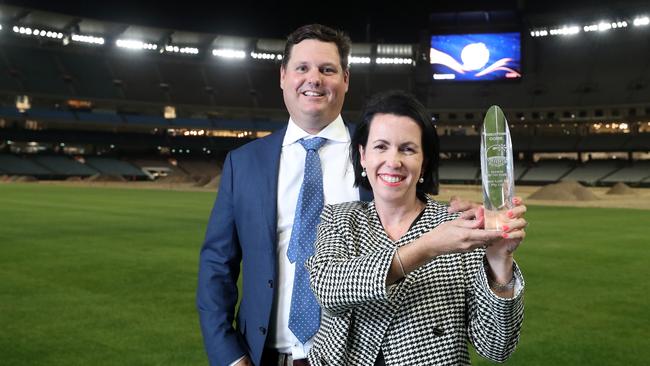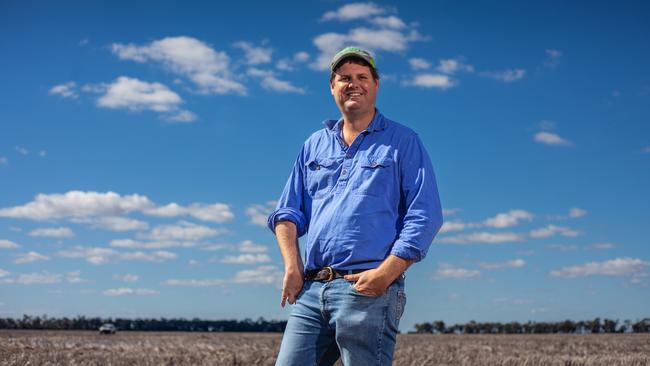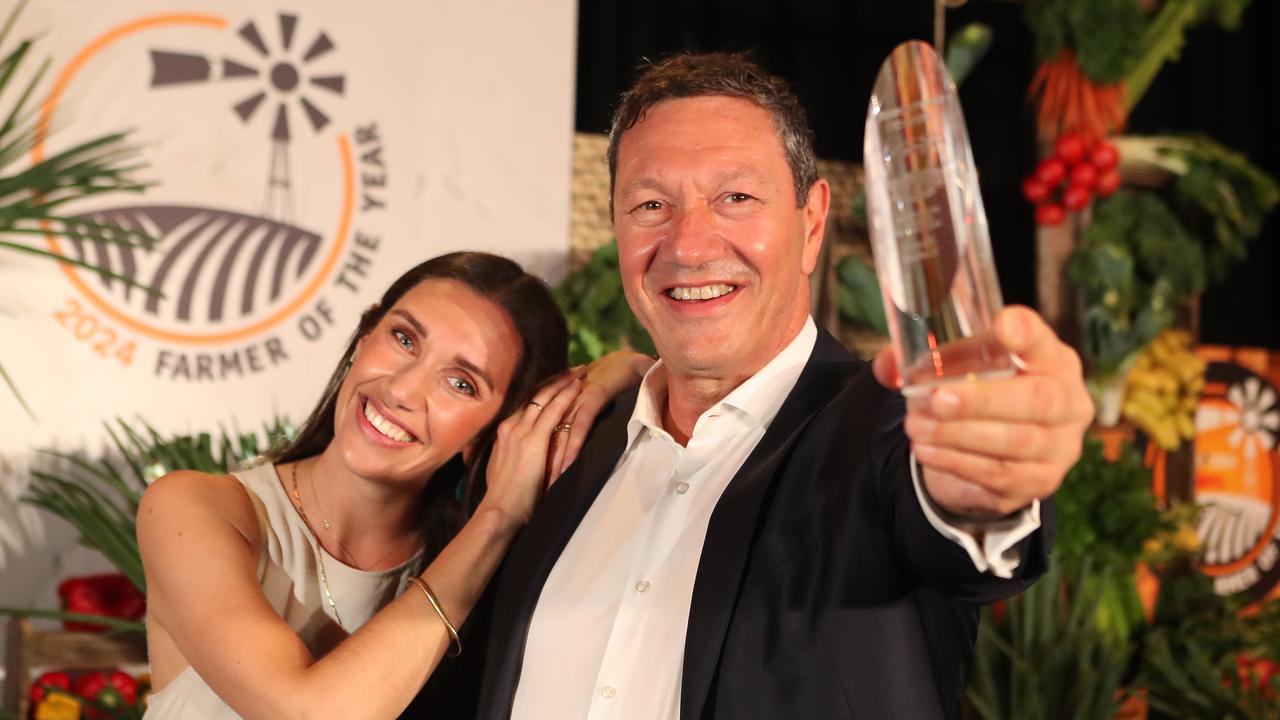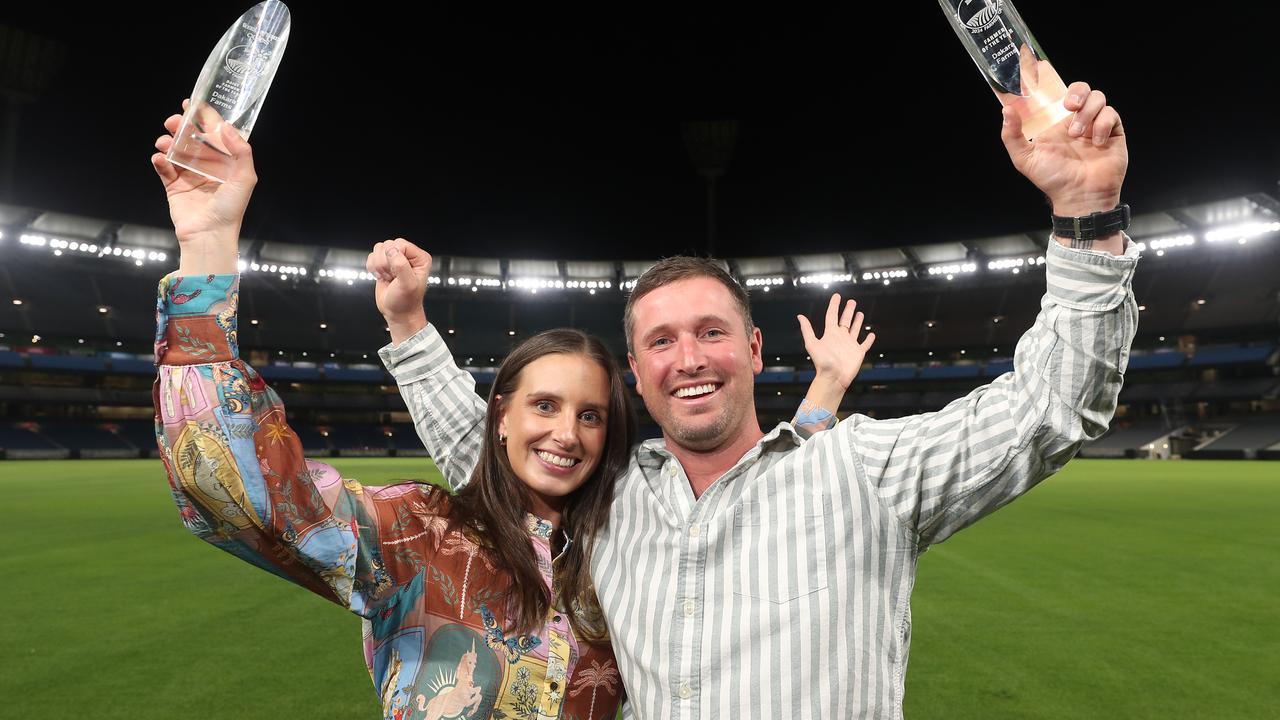Farmer of the Year: 2023 winners Nigel and Vanessa Corish recap award
For Nigel and Vanessa Corish, winning Farmer of the Year 2023 has resulted in a growing acknowledgment of their work at the forefront of sustainable farming practices.
For Nigel and Vanessa Corish, being named winners of the 2023 The Weekly Times Coles Farmer of the Year award has resulted in a growing acknowledgment of their work at the forefront of sustainable farming practices in the months that have followed.
The Queensland cropping couple have worked for years on continuously increasing productivity at their Condamine property on the Western Darling Downs, and are buoyed by a positive outlook for Australian agriculture.
“It’s certainly been very humbling, and it’s giving me a wider network and acknowledgment among the industry in Australia,” Nigel said.
“It was certainly much more wide reaching than I ever expected, and has allowed me to develop more connections within both industry and government.”

A SUSTAINABLE FOCUS
Nigel and Vanessa grow dryland wheat, barley, chickpeas, sorghum and irrigated cotton across 4000 hectares. Behind their New Leaf Ag Pty business is a forward-thinking approach to growing crops and a passion for driving sustainability in their business, as well as for those around them.
“Sustainability is certainly an emerging aspect of Australian agriculture, and it’s good to be at the forefront or leading edge of those conversations,” said Nigel.
“I think a lot of farmers are either hesitant, if not afraid, of going down the sustainability track, so I think education is going to play a huge role moving forward.”
With more than 20 years of farming experience, it was multiple trips overseas in 2014 that really exposed Nigel to different sustainable practices being used across the world.
As part of a Nuffield Scholarship, visits to North America, Europe and Asia spiked his interest in fertiliser and soil health, and narrowed his focus on how he could implement similar practices at home.
SOIL CARBON PROJECT
This focus eventually led Nigel to embark on a 25-year soil carbon project, one of the first undertakings of such nature on a cropping property in Australia.
“I wanted to be the guinea pig to not only show to growers, but to industry and consumers that the farming practices we are implementing are having benefits on soil health and sustainability,” Mr Corish said.
“So I engaged CarbonLink and what we’re really trying to do is implement new farming practices both into the irrigated cropping and grazing components of the business, and really trying to increase the carbon levels of the soil.”

Whether Nigel will be able to build carbon in the soil, or see an increase enough to match his investment won’t be known immediately, but his gut feel is that he will be able to make his investment back in five years.
“I think soil carbon will be more valuable in the coming years, and at some point in time farmers will need to be accountable for their emissions, so I’d rather be banking credits now in case we need to use them in the future.”
Putting forward $100,000 of his own money into the project, Nigel said the returns will come from providing this information to the industry.
“Where the return is going to be is allowing me to show to anyone, be very transparent, what the carbon balance is of what I’m sequestering off my own farm. I think it’s going to be very powerful moving forward,” he said.
Farmer of the Year 2024 nominations are now open
BEST EVER WINTER CROP
This year, the Corish family is perhaps set for its best winter crop ever, after great seasonal conditions in the past few months.
“We had really good rain over March, April and May, and we planted wheat, barley and chickpeas on the back of that rain. Then we’ve got full water availability for our irrigated cotton crop, setting up for a good summer as well,” he said.
“Touch wood, but we’re set up for a really good season on the farm at the moment.”
However, Nigel, like many farmers, is starting to feel rising inflation and input costs impacting the bottom line.
“Our chemical costs over summer and our overhead costs have increased 30 per cent over the last 12 months, which is affecting our margins and profitability,” he said.
“Luckily the commodity prices have been holding up reasonably over a 12-month period, but no doubt they’re starting to back off now, particularly the wheat and barley prices.”
Nigel has an optimistic outlook for the future of Australian agriculture, and especially sees a push towards carbon positive and carbon neutrality in 30 years’ time.
“There’s certainly a bright future within Australian agriculture. I think Australian farmers are the best in the world. I might be biased, but from a productivity, trust and compliance point of view we’re very good at what we do,” he said.
“We’ve got some of the best researchers in the world, and I’d encourage anyone, young or old to get involved with agriculture.”




